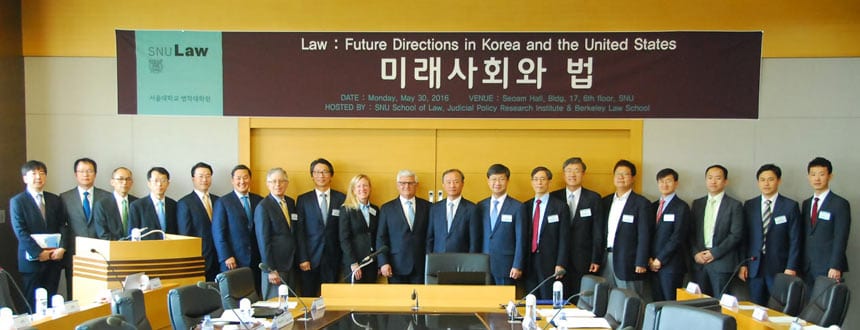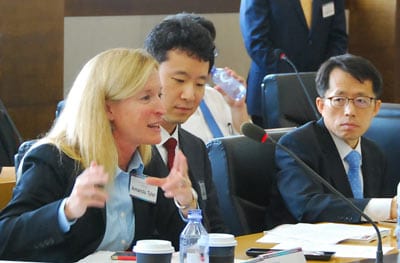
By Susan Gluss
Berkeley and Korean law scholars tackled issues of national security, constitutional law and the environment at an inaugural workshop last month that may set the stage for closer collaboration. The participants convened in Seoul amidst the gleaming buildings of this modern city. South Korea, a young democracy, held its first free and fair direct presidential election barely thirty years ago, and its legal scholars have consulted with their Berkeley Law counterparts ever since.
The workshop was co-sponsored by South Korea’s top law school, Seoul National University Law School (SNU), and Berkeley Law’s Korea Law Center.
National security issues in South Korea involve “two competing imperatives,” said Korea Law Center co-director Laurent Mayali, “the need to protect people’s civil rights and ensure their safety.” Mayali presented a working paper on counter-terrorist legislation in Western Europe, Japan and the United States, along with center co-director John Yoo.
“Because of the country’s history of dictatorship, civil liberties are at the heart of its legal debates,” Mayali said.

South Korea is also concerned with the belligerence of its northern neighbor. Yet the session on surveillance technology sparked strong commentary from Korean respondents who worried about the curtailment of individual rights.
During the workshop and evening events, a number of faculty also discussed a possible framework for reunification with North Korea, based on the federalist principles—and separation of powers—outlined in the U.S. constitution.
Berkeley Law’s Daniel Farber, faculty co-director of the Center on Law, Energy & the Environment, and professor Amanda Tyler also presented papers at the workshop, while professor Taeku Lee offered commentary.
Environmental concerns
Despite its modernity, Seoul’s air is overly polluted due to its rapid industrialization, as well as smog from nearby countries. Aware of the health hazards facing its citizens, the country’s leaders are embracing renewable energy in an effort to cut greenhouse gas emissions.
As part of its green growth and sustainability efforts, South Korea recently launched its first carbon trading market, similar to cap-and-trade systems in the U.S. and elsewhere. This ambitious program is a “model” for developing countries trying to “reduce their reliance on coal,” Farber said.
The incoming dean of SNU, Hong Sik Cho ’93 LL.M., J.S.D., has a keen interest in efforts to clean up his country’s sullied environment. Dean Cho studied environmental law while a student at Berkeley Law and returned to South Korea as its first environmental law professor.
Constitutional law
Tyler presented a chapter from her forthcoming book, Habeas Corpus Goes to War. She discussed the erosion of civil rights of American citizens detained in Hawaii and the U.S. during World War II.
In response, a South Korean commentator discussed the habeas corpus policies enacted during the U.S. occupation of South Korea after WWII, an essential element of its nascent democracy.
Tyler called the workshop “a wonderful opportunity to exchange ideas and build relationships” with distinguished members of South Korea’s legal profession and academe, many of whom studied at Berkeley Law as visiting scholars, or earned their LL.M., J.S.D., or J.D. degrees here.
Alumni club
The South Korean alumni group, the “Berkeley Club,” is one of the most active within the law school’s global community. The club held its annual meeting the same weekend as the workshop, so Berkeley Law professors could attend. Club members comprise the country’s political and legal elite, including a former prime minister, a current Supreme Court justice, and lawyers from the country’s leading firms.
The Korea Law Center will host the annual workshop in Berkeley in 2017, maintaining a bilateral exchange of ideas between the two law schools—and the two countries.
For photos and details about the faculty workshop, go here.